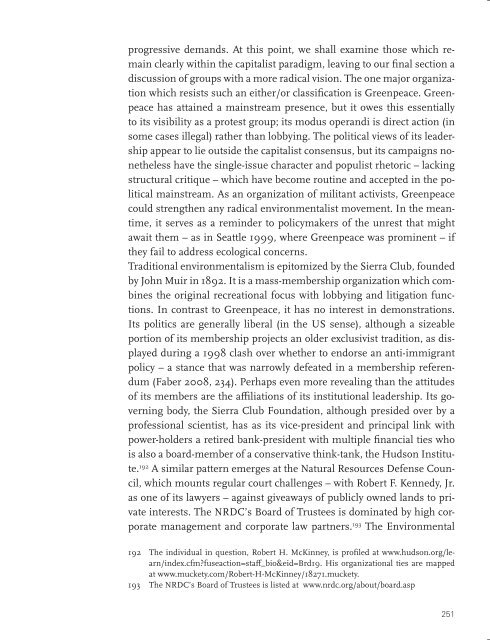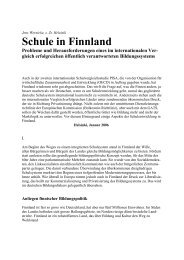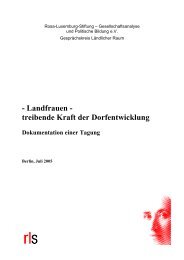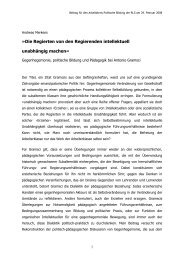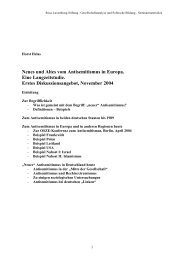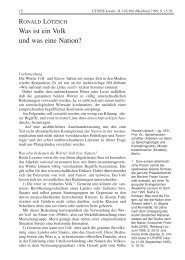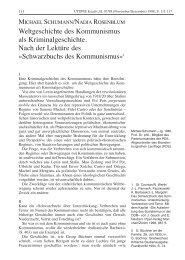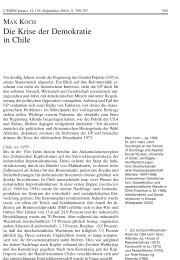Grünen Kapitalismus - Rosa-Luxemburg-Stiftung
Grünen Kapitalismus - Rosa-Luxemburg-Stiftung
Grünen Kapitalismus - Rosa-Luxemburg-Stiftung
Erfolgreiche ePaper selbst erstellen
Machen Sie aus Ihren PDF Publikationen ein blätterbares Flipbook mit unserer einzigartigen Google optimierten e-Paper Software.
progressive demands. At this point, we shall examine those which remain<br />
clearly within the capitalist paradigm, leaving to our final section a<br />
discussion of groups with a more radical vision. The one major organization<br />
which resists such an either/or classification is Greenpeace. Greenpeace<br />
has attained a mainstream presence, but it owes this essentially<br />
to its visibility as a protest group; its modus operandi is direct action (in<br />
some cases illegal) rather than lobbying. The political views of its leadership<br />
appear to lie outside the capitalist consensus, but its campaigns nonetheless<br />
have the single-issue character and populist rhetoric – lacking<br />
structural critique – which have become routine and accepted in the political<br />
mainstream. As an organization of militant activists, Greenpeace<br />
could strengthen any radical environmentalist movement. In the meantime,<br />
it serves as a reminder to policymakers of the unrest that might<br />
await them – as in Seattle 1999, where Greenpeace was prominent – if<br />
they fail to address ecological concerns.<br />
Traditional environmentalism is epitomized by the Sierra Club, founded<br />
by John Muir in 1892. It is a mass-membership organization which combines<br />
the original recreational focus with lobbying and litigation functions.<br />
In contrast to Greenpeace, it has no interest in demonstrations.<br />
Its politics are generally liberal (in the US sense), although a sizeable<br />
portion of its membership projects an older exclusivist tradition, as displayed<br />
during a 1998 clash over whether to endorse an anti-immigrant<br />
policy – a stance that was narrowly defeated in a membership referendum<br />
(Faber 2008, 234). Perhaps even more revealing than the attitudes<br />
of its members are the affiliations of its institutional leadership. Its governing<br />
body, the Sierra Club Foundation, although presided over by a<br />
professional scientist, has as its vice-president and principal link with<br />
power-holders a retired bank-president with multiple financial ties who<br />
is also a board-member of a conservative think-tank, the Hudson Institute.<br />
192 A similar pattern emerges at the Natural Resources Defense Council,<br />
which mounts regular court challenges – with Robert F. Kennedy, Jr.<br />
as one of its lawyers – against giveaways of publicly owned lands to private<br />
interests. The NRDC’s Board of Trustees is dominated by high corporate<br />
management and corporate law partners. 193 The Environmental<br />
192 The individual in question, Robert H. McKinney, is profiled at www.hudson.org/learn/index.cfm?fuseaction=staff_bio&eid=Brd19.<br />
His organizational ties are mapped<br />
at www.muckety.com/Robert-H-McKinney/18271.muckety.<br />
193 The NRDC’s Board of Trustees is listed at www.nrdc.org/about/board.asp<br />
251


